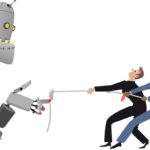Artificial intelligence doesn’t create, or destroy jobs. It transforms them
A recent White House report analyzes the impact of artificial intelligence (AI) and other exponential technologies on the labor market. Doomsayers estimate that the U.S. will lose more than three million jobs from IA, but optimists recall that the phenomenon will create millions of new jobs.

Technological advances have added many new words to our everyday vocabulary – words that that describe new realities like blockchain, big data, APIs and artificial intelligence.
Experts have created a concept that encompasses this entire phenomenon: the new, or fourth, industrial revolution where exponential technologies are the drivers of change, just like the steam engine two centuries ago. Today, the fears of the Luddite movement are reemerging. Will increasingly intelligent machines take over our jobs?
One of the Obama Administration’s final reports analyzes the impact of artificial intelligence on the labor market. It is an economic and political document that explores employment, as well as education and even social policies. The Democratic government’s team was particularly concerned by the possibility of increasing social inequality as a result of IA developments.
This risk is based on an undeniable truth, which clearly separates this industrial revolution from the first industrial revolution in terms of the impact on the labor market. More than two centuries ago, those affected by advances in machines were qualified artisans, who watched as their jobs were replaced by machines. On the other hand, those machines increased the productivity of less qualified workers, and in total, salaries rose and inequality fell.
Now it’s different. The routine, predictable and easily programmable jobs are those that will start to disappear. With few exceptions, these jobs are generally held by people with little education. An OECD report estimates that only 1% of people in these jobs have a high school degree.
However, technology is driving the productivity of those that stand out in abstract thinking, creative tasks and problem solving – jobs for people with higher education and good salaries that are on the rise.
Engine of economic growth
Experts warn that it is not actually a cause for concern. The impact on the labor market will be the same – although more pronounced – as increasing computerization and the digitization of the economy. But, just how far-reaching will these effects be?
Economic advisers from the Obama Administration estimate that 2.2 million to 3.1 million U.S. jobs are under threat, to a greater or lesser extent, from IA advances. They stress, however, that they do not take into account the other part of the equation – the new jobs that will be created.
And the outlooks are not necessarily bad. The report cites an Accenture study that confirms that AI could double annual GDP growth from now until 2035 in the twelve developed countries that were assessed. Spain is one of them, which would go from 1.7% GDP growth to 2.5%.
In line with this optimistic perspective, the White House report explains the four categories of jobs that will grow in the future, thanks to AI.
- Jobs where humans engage directly with machines that think
We often refer to augmented intelligence, and not artificial intelligence, to refer to processes in which the machine complements human work, adding another dimension, instead of replacing it. For example, Watson, IBM’s supercomputer, may improve early detection of lung cancer, but the doctor selects the treatment and guides patients and family members throughout the process. In this case, new jobs aren’t created – existing professions are enhanced. But White House experts are convinced that there is a new niche in the labor market: people working hand in hand with AI, and both humans and the machine will be essential.
- Jobs developing artificial intelligence
It’s a good time to be a highly skilled software developer and computer engineer, thanks to AI, but they aren’t the only ones who will benefit from this technology. Since artificial intelligence largely depends on the data behind it, there will be increasing demand for jobs relating to data processing. And the White House report even says that the new social realities brought about by AI could generate greater demand for philosophers, sociologists and experts in ethics.
- Jobs supervising artificial intelligence
AI machines will need minor repairs and maintenance, which will create mechanic and technician jobs. Real-time supervision will also be required, especially in situations involving morality, ethics and social skills, which AI may lack. These new AI professions must also ensure that these machines’ ability to learn does not take them away from the reason they were created.
- Jobs that respond to the profound social changes caused by AI
Artificial intelligence will alter our entire environment, and this readjustment will create new needs in the job market. The White House report refers to two in particular: cybersecurity, as new methods will be needed to detect fraudulent messages and transactions; and especially, the development of self-driving cars, which will result in significant changes in traffic laws and infrastructure.